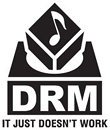qubit
Overclocked quantum bit
- Joined
- Dec 6, 2007
- Messages
- 17,865 (2.86/day)
- Location
- Quantum Well UK
| System Name | Quantumville™ |
|---|---|
| Processor | Intel Core i7-2700K @ 4GHz |
| Motherboard | Asus P8Z68-V PRO/GEN3 |
| Cooling | Noctua NH-D14 |
| Memory | 16GB (2 x 8GB Corsair Vengeance Black DDR3 PC3-12800 C9 1600MHz) |
| Video Card(s) | MSI RTX 2080 SUPER Gaming X Trio |
| Storage | Samsung 850 Pro 256GB | WD Black 4TB | WD Blue 6TB |
| Display(s) | ASUS ROG Strix XG27UQR (4K, 144Hz, G-SYNC compatible) | Asus MG28UQ (4K, 60Hz, FreeSync compatible) |
| Case | Cooler Master HAF 922 |
| Audio Device(s) | Creative Sound Blaster X-Fi Fatal1ty PCIe |
| Power Supply | Corsair AX1600i |
| Mouse | Microsoft Intellimouse Pro - Black Shadow |
| Keyboard | Yes |
| Software | Windows 10 Pro 64-bit |
Rice University and Duke University are the latest in a long line of educational institutions to fund research on the effect of using restrictive Digital Rights Management (DRM) to try and control levels of so-called "piracy", which is allegedly reducing sales of content-only, infinite goods/virtual products, such as music, movies, computer games and books. (Some observers writing about DRM replace the word "Rights", giving us the phrase Digital Restrictions Management, which seems a more accurate description of what it's really about and removes the veneer of legitimacy from it. When buying DRM'd content, you are buying digital handcuffs, nothing more, nothing less.) The universities sponsored a study called Music Downloads and the Flip Side of Digital Rights Management Protection and what it found is that contrary to popular belief amongst the big content companies, removing DRM can actually decrease levels of piracy and increase sales. The fact is that DRM is always broken by hackers and pretty quickly too, often within a day or two (there isn't a single one still standing) leaving legal users who work within its confinements with all the restrictive hassles that it imposes, while the pirates get an unencumbered product to do with as they please. How is this progress?


The study says:
The points above are something that websites such as Techdirt have been saying for years, so the message has been out there for a long time, if only the big corporations would listen.
This study is due to be published in the November-December issue of Marketing Science, produced by the Marketing Science Institute, a well-respected organization established 50 years ago in 1961. However, looking at the MSI's website, one can see that they unfortunately do operate a paywall system, itself a form of DRM. Therefore, it seems safe to say that this new research will be locked away from the general public, which is ironic indeed. On top of that a copy is likely to appear on file sharing websites like The Pirate Bay anyway, so why bother?
While this story was reported directly from Rice University's announcement, thanks go to engadget for their news story, which inspired this one.
TorrentFreak has also reported on this story, here and is a website well worth reading.
View at TechPowerUp Main Site


The study says:
Then the punchline, the part that really matters in this whole debate:Removal of these restrictions makes the product more convenient to use and intensifies competition with the traditional format (CDs), which has no DRM restrictions. This increased competition results in decreased prices for both downloadable and CD music and makes it more likely that consumers will move from stealing music to buying legal downloads. Unlike in earlier literature, we examine consumers' choices among all the major sources of music. By analyzing the competition among the traditional retailer, the digital retailer and pirated music, we get a better understanding of the competitive forces in the market.
Yes, that's right, preventing someone from making a copy in no way equates to that person actually buying a copy, which is really quite obvious to most people, except the big content companies.Decreased piracy doesn't guarantee increased profits. In fact, our analysis demonstrates that under some conditions, one can observe lower levels of piracy and lower profits.
The points above are something that websites such as Techdirt have been saying for years, so the message has been out there for a long time, if only the big corporations would listen.
This study is due to be published in the November-December issue of Marketing Science, produced by the Marketing Science Institute, a well-respected organization established 50 years ago in 1961. However, looking at the MSI's website, one can see that they unfortunately do operate a paywall system, itself a form of DRM. Therefore, it seems safe to say that this new research will be locked away from the general public, which is ironic indeed. On top of that a copy is likely to appear on file sharing websites like The Pirate Bay anyway, so why bother?
While this story was reported directly from Rice University's announcement, thanks go to engadget for their news story, which inspired this one.
TorrentFreak has also reported on this story, here and is a website well worth reading.
View at TechPowerUp Main Site
Last edited:




 Not everybody has a credit card, or can use PayPal. Yet physical media for music stayed at roughly the same price (and then the added DRM too) even though the PPP decreased. AND THEY BLAME IT ON PIRACY!?!?!?
Not everybody has a credit card, or can use PayPal. Yet physical media for music stayed at roughly the same price (and then the added DRM too) even though the PPP decreased. AND THEY BLAME IT ON PIRACY!?!?!? 
